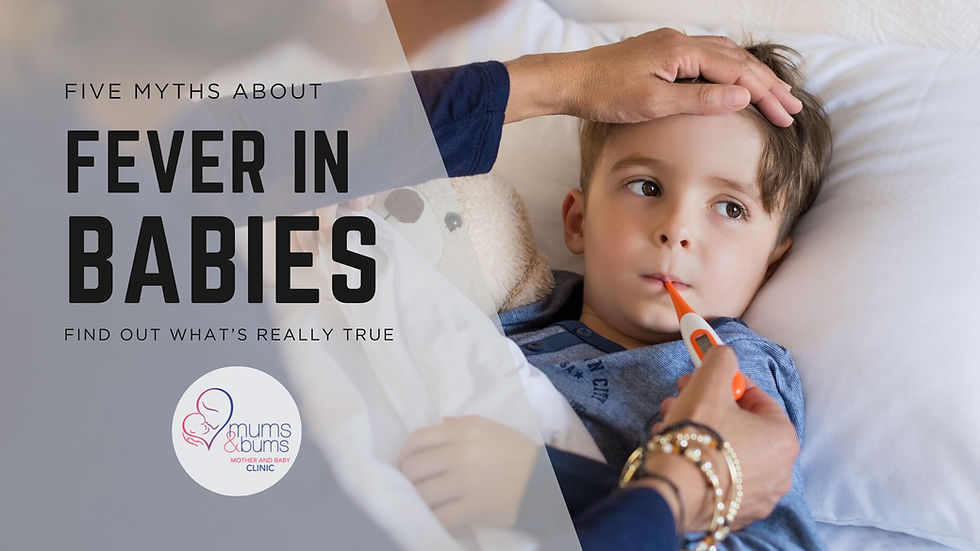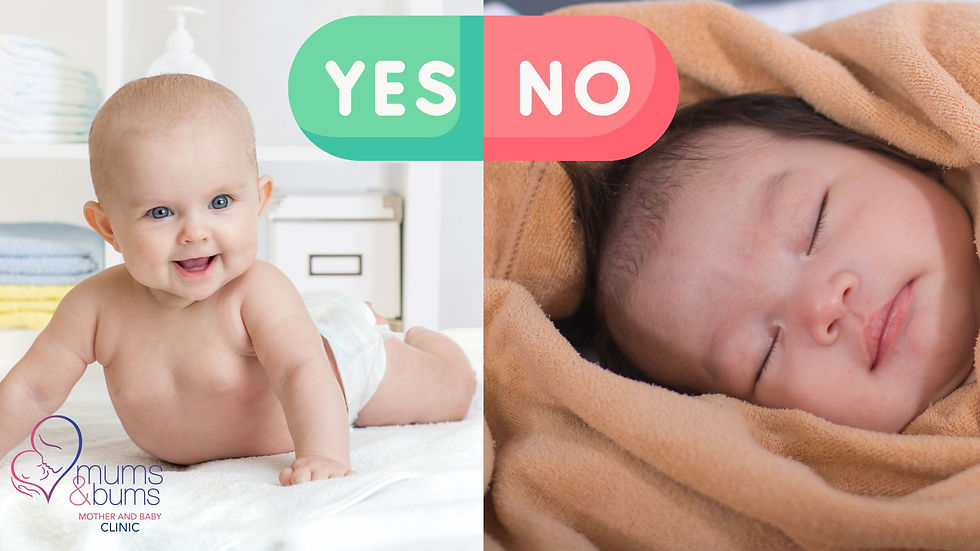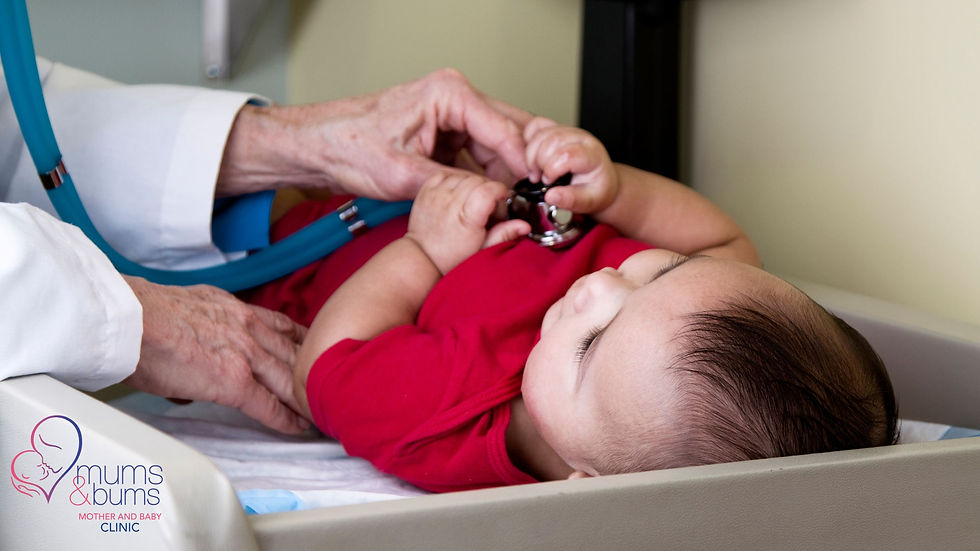Fever in Babies: The 5 Biggest Myths South African Parents Believe
- Samantha Pieterse

- Sep 4, 2025
- 11 min read
Updated: Feb 10

Fever is one of the most common reasons Centurion parents visit our clinic or the emergency room. The moment the thermometer climbs, panic sets in, Google searches happen at lightning speed, granny’s remedies are debated, and before you know it, half the medicine cupboard has been opened.
When it’s your baby, even the smallest temperature spike feels scary. You imagine the worst, and every little cry suddenly seems like a red flag. But a fever is usually just a symptom, not an illness on its own. It’s the body’s way of saying, “Hey, I’m fighting something off.”
The problem is, many of us grew up with old-school ideas about fever. Some of those ideas are harmless, but others can make things worse. That’s why it’s so important to separate myths from facts.
So, let’s unpack the five biggest fever myths South African parents still believe, and highlight what’s really worth your concern (and what you can safely stop stressing over).
At a Glance: Baby Fever Myths & FactsFever is one of the most common reasons parents bring babies to the clinic, but most of what we hear about fever isn’t true. Here’s what every South African parent should know:
Need expert reassurance today? Book your appointment online at Mums & Bums Clinic in Centurion. |
Understanding Fever in Babies
Before we jump into the myths, it helps to know what fever really is. Many parents in South Africa worry that the moment their baby feels warm, but not every flushed cheek means trouble. Fever has a clear medical definition, and understanding it can save you stress (and unnecessary midnight hospital runs).
What Counts as a Fever?
In babies, a fever is usually defined as a:
Rectal temperature of 38°C or higher in babies under one and 38.5°C or higher in babies and children over one. |
This is the most accurate method for measuring, especially in babies under one year old. Forehead strips and “hand on the forehead” checks are unreliable. They can make you think your child has a fever when they don’t.
It’s also important to separate teething warmth from real fever. Teething may cause slight irritability, drooling, or a slight increase in body temperature, but it does not typically push temperatures into the true fever range. If your baby’s thermometer shows 38°C or above, that’s a genuine fever and should be monitored properly.
Why Fever Happens
Fever is not an illness. It’s a symptom and a defence mechanism. When germs such as viruses or bacteria enter the body, the immune system raises the temperature to make it harder for those bugs to multiply. This is why many mild childhood illnesses, from colds to viral tummy bugs, come with a temperature spike.
In fact, in many cases, a fever is a sign that your baby or child’s immune system is working well. For example, after certain vaccinations, babies may develop a low-grade fever. This doesn’t mean something is wrong. It shows their body is building protection.
That said, while fever itself is often harmless, it’s your baby’s overall condition that matters most. A happy, playful baby with a mild fever is very different from a lethargic baby who refuses to feed. Knowing this distinction can help you respond calmly and seek medical care only when it’s genuinely needed.

Common Parenting Worries About Baby Fever in South Africa
Every family has its own way of handling fever, shaped by culture, community, and the endless stream of advice available at the tap of a finger. Some of these practices are harmless, but others can lead to unnecessary worry or even put babies at risk.
Cultural Beliefs and Traditional Home Remedies for Baby Fever
In South Africa, many parents still reach for remedies passed down through generations. From rubbing babies with spirits or vinegar, to wrapping them in heavy blankets to “sweat out” the fever, to offering rooibos tea for hydration, these practices are common in households across the country.
Some of these traditions may offer comfort. For example, giving cooled rooibos tea to an older child can be soothing.
But others are unsafe. Spirits and vinegar can irritate a baby’s delicate skin, and overdressing or covering them can dangerously raise body temperature, sometimes increasing the risk of fever convulsions.
While family wisdom often comes from a place of love, it’s important to know which remedies help and which can harm. Evidence-based care, like keeping your baby cool, hydrated, and comfortable, is always the safest path.
Parenting Groups, WhatsApp Chats, and TikTok Fever Advice
We, as modern parents, don’t always turn to granny, but often turn to our phones. WhatsApp parenting groups, Facebook forums, and TikTok tips can feel like lifelines at 2 am when your baby is unsettled.
But misinformation spreads quickly online. Well-meaning advice such as “it’s just teething” or “give antibiotics right away” can reinforce myths and delay proper care. Parents searching for “baby fever South Africa” often land on mixed information, some correct, some misleading.
This is why reliable, medically accurate guidance matters so much. Knowing when to stay calm and when to see a nurse or doctor can save parents from sleepless nights and unnecessary panic.

Myth #1: Fever Always Means Something Serious
One of the most common myths parents believe is that if babies have a fever, it must mean something is very wrong. This fear is understandable. Nobody likes to see their little one unwell, but it’s not always accurate.
The truth: Most fevers are not emergencies. A fever is the body’s natural way of fighting infection, and in babies older than three months, mild fevers are often linked to common viral illnesses such as colds, flu, or stomach bugs. After routine childhood vaccinations in South Africa, babies may also get a slight fever, a perfectly normal immune response that shows their body is building protection.
When to worry about a fever:
If your baby is under 3 months old with a rectal temperature of 38°C or higher.
If the fever lasts more than 3 days without improvement.
If fever is accompanied by severe symptoms such as difficulty breathing, seizures, or persistent vomiting.
Otherwise, most fevers can be safely managed at home while you keep an eye on your baby’s comfort and hydration.
Myth #2: Teething Causes High Fevers
It’s a story most parents in South Africa have heard: “Don’t worry, it’s just teething.” While teething can make babies cranky, drooly, and restless, it does not cause high fevers.
The truth: Research shows that teething may cause a very slight rise in temperature, but anything above 38°C is not from teething. If your baby develops a real fever, it’s far more likely to be a viral or bacterial infection that deserves proper attention.
Why this myth sticks around: teething usually happens around 6–12 months, the same time babies start catching more infections as they explore the world and put everything in their mouths. Illness just gets blamed on teeth when the two overlap.

Myth #3: You Must “Sweat Out” the Fever
Some parents still believe that bundling babies in blankets or overdressing them will help “sweat out” a fever. This idea has been passed down for generations, but it’s not only unhelpful. It can be risky.
The truth: Overheating a baby can actually make things worse. Babies can’t regulate their body temperature as well as adults, and trapping in heat can push their temperature up even higher. This increases the risk of dehydration and, in some cases, may even trigger a fever convulsion (febrile seizure).
Fever convulsions happen when a child’s temperature rises suddenly, and they can cause jerking movements, eye rolling, or even a brief loss of consciousness. While these seizures usually last only a few minutes and are not dangerous in the long term, they are terrifying to witness, and overheating your baby unnecessarily can raise that risk.
The safer approach:
Keep your baby in light, breathable clothing
Keep the room comfortably cool
Offer frequent feeds or sips of fluid (depending on age)
Use fever medicine only if your child is uncomfortable, not just to “bring the number down”
Letting your baby “sweat it out” won’t cure the fever. It only adds more strain to their little body.
Myth #4: Antibiotics Will Fix Any Fever
In South Africa, many parents still believe antibiotics are the answer to every fever. Sometimes they’re even requested directly at the clinic.
The truth: Antibiotics only treat bacterial infections, not viruses. The majority of childhood fevers come from viral infections like colds, flu, RSV, or gastroenteritis, and giving antibiotics won’t help at all. In fact, using antibiotics unnecessarily can create antibiotic resistance, meaning that when your child actually needs them one day, the medicine might not work as well.
Doctors decide on antibiotics only after examining the child and, if needed, running tests to confirm a bacterial infection. It’s not about “denying treatment,” but about giving the proper treatment.
Myth #5: Fever Medicine Must Always Be Given Immediately
The instinct to grab the paracetamol (Panado/Ponstan) the moment a baby feels warm is very common. Parents often feel they’re “doing nothing” if they don’t give medicine right away.
The truth: Fever medicine isn’t always necessary. The purpose of paracetamol or ibuprofen is to make your baby more comfortable, not to “cure” the fever itself. If your baby is alert, feeding, and playing despite a mild fever, you can monitor them without giving medicine.
When medication helps with a fever:
If your baby is very uncomfortable or crying inconsolably
If they’re struggling to sleep
If they’re refusing feeds due to discomfort
Always follow safe dosing guidelines and avoid combining different fever medicines without medical advice. And never give aspirin to children, it’s unsafe and linked to a serious condition called Reye’s syndrome.
Not sure if medicine is needed? Book a consultation and get personalised advice.

When to Worry: Urgent Baby Fever Warning Signs
Most fevers in babies are mild and can be managed safely at home, but there are times when a fever is a red flag for something more serious. Knowing these warning signs helps parents act quickly without second-guessing themselves.
Call your nurse or doctor the same day if your baby:
Is under 3 months old with any fever (38°C or higher): At this age, even a small temperature rise can signal a serious infection because newborn immune systems are still very immature.
Has a stiff neck, seizures, or difficulty breathing: These may point to serious conditions like meningitis, respiratory infection, or fever convulsions (febrile seizures), and need urgent medical attention.
Seems unusually floppy, drowsy, or unresponsive: If your baby isn’t waking easily, not making eye contact, or feels “not themselves,” it’s safer to get checked right away.
Refuses to feed and shows signs of dehydration: Look for a dry mouth, no tears when crying, or fewer wet nappies than usual. Dehydration can worsen quickly in infants with fever.
Has a persistent high fever that doesn’t improve with comfort measures or medicine, especially if it lasts more than 72 hours or spikes above 39°C in older babies.
If your baby shows these warning signs, book a same-day clinic visit.
When to head straight to the emergency room
Any seizure
Trouble breathing or turning blue around the lips
Rash that doesn’t fade when pressed (can be a sign of measles)
If any of these happen, don’t wait. Seek immediate medical care.
Safe Home Care for Babies with Fever
Not every fever means rushing to the emergency room. In fact, most baby fevers can be managed safely at home with simple care. The goal is to keep your baby comfortable while their body fights the infection.
Dos for Caring for a Baby with Fever
Keep them lightly dressed and comfortable: Avoid overdressing or heavy blankets. A cool, calm environment helps prevent overheating.
Offer regular feeds or sips of fluids: Breast milk, formula, or small sips of water for older babies, to keep hydration on track. Fever increases fluid loss, so extra feeds are important.
Use a reliable thermometer for checks: Rectal thermometers are most accurate for infants. Ear and forehead thermometers can give false highs or lows, especially in younger babies.
Don’ts for Baby Fever Care
Don’t give aspirin: Aspirin is unsafe for children and linked to a rare but serious condition called Reye’s syndrome. Stick to paracetamol or ibuprofen (if age-appropriate and advised).
Don’t rub with spirits or vinegar: These traditional remedies can irritate the skin and cause harmful alcohol absorption. They don’t lower the fever safely.
Don’t wake a sleeping baby just to check the temperature: If your baby is resting comfortably, let them sleep. Rest is healing.
How Doctors and Nurses Assess Baby Fever Differently
At Mums & Bums Clinic in Centurion, we often remind parents: fever is just one piece of the puzzle. A thermometer can tell us the number, but it doesn’t tell us the whole story.
When your baby comes in with a fever, we don’t only ask, “How high is it?” We look closely at your baby’s overall condition:
Are they alert and responsive?
Are they breathing comfortably?
Are they feeding well and staying hydrated?
Are they making eye contact and engaging as usual?
A baby who is active, smiling, and feeding with a mild fever is very different from a baby who is floppy, refusing feeds, or struggling to breathe, even if the temperatures are exactly the same.
What Tests Might Be Done
If we suspect something more serious, we may run some simple tests to get answers quickly. These can include:
Urine tests to check for urinary tract infections (a common hidden cause of fever in babies)
Blood tests to look for bacterial infections
Swabs or X-rays if needed, depending on your baby’s symptoms
These checks help ensure your baby gets the right treatment, whether that’s reassurance and home care, or medicine and closer monitoring.

Frequently Asked Questions About Baby Fever
Should I rush to the hospital every time my baby has a fever?
Not always. If your baby is otherwise alert, feeding well, and making eye contact, you can usually monitor at home. But if your baby is under 3 months old, has trouble breathing, a seizure, or seems unusually floppy or unresponsive, seek medical help immediately.
Can traditional remedies be used safely?
Some cultural practices, like offering cooled rooibos tea to older children, may be harmless. But avoid remedies that risk overheating (wrapping in blankets), poisoning (spirits or vinegar rubs), or dehydration. When in doubt, double-check with your nurse or doctor before trying anything at home.
What’s considered a high fever in babies?
In babies under 3 months, any fever above 38°C is considered high and needs urgent medical review.
In older babies, a persistent fever above 39°C, or one that lasts more than 3 days, should also be checked by a healthcare professional.
Do vaccines cause fevers?
Yes, a mild fever is common after vaccinations. It’s a normal response that shows the immune system is building protection. These fevers are usually short-lived and resolve on their own.
Can fever cause seizures in babies?
Sometimes. A rapid rise in temperature can trigger a fever convulsion (febrile seizure), especially in children between 6 months and 5 years. While these seizures are frightening, they’re usually harmless and don’t cause long-term damage. Always have your child checked afterwards to rule out serious causes.
Replacing Fever Fear with Fever Facts
Fever is one of the most common reasons parents worry, and one of the most misunderstood. In most babies, fever is a normal response to infection and indicates that their immune system is functioning properly. Teething doesn’t cause high fevers, antibiotics aren’t a cure-all, and bundling babies up to “sweat it out” can do more harm than good.
What matters most is looking at the whole child, how they’re feeding, breathing, and responding, rather than just the number on the thermometer. With the right knowledge, parents can avoid unnecessary panic, manage fever safely at home, and recognise the red flags that do need medical attention.
Worried about your baby’s fever and want answers today?
Skip the calls and waiting, you can book your appointment online at Mums & Bums Clinic in Centurion in just a few clicks.
💬 If you’re unsure or your baby’s fever is making you anxious, you don’t have to figure it out alone. We support parents every day with baby fevers, check-ups, and vaccinations. Book a consult and get the expert reassurance you need to care for your little one with confidence.



















Comments